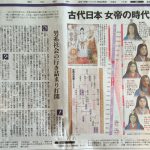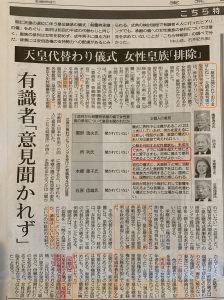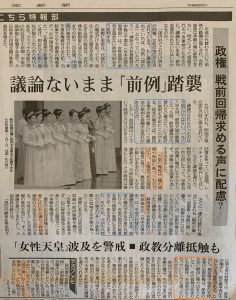◆Japan’s emperor retiring (The Guardian)
Only a cruel despot would stop Japan’s emperor retiring
Akihito has devoted his life to the happiness of his people. In return, he deserves to be allowed to retire in peace
Emperor Akihito. ‘In his highly unusual speech to the Japanese people, he obliquely indicated both his desire to relinquish the throne while still alive and referred to himself as ‘a symbol of the state’ no fewer than seven times.’ Photograph: Koji Sasahara/AP
Thursday 11 August 201618.07 BSTLast modified on Friday 12 August 201612.31 BST The Guardian
What happens when God wants to retire? Although the emperor of Japan is no longer a deity, there was a time, not so long ago, when the country’s imperial rulers were believed to govern earthly affairs and those of heaven. The current emperor, Akihito, is very much human and has no desire to be a god – although Japan’s ruling Liberal Democratic party, led by prime minister Shinzo Abe, would like to restore Japan’s pre-war constitution and to return the emperor to god-like status.
That is not something the 82-year-old emperor desires either for himself or his successors. In his highly unusual speech to the Japanese people, he obliquely indicated his desire to relinquish the throne while still alive and referred to himself as “a symbol of the state” no fewer than seven times.
A pacifist who opposes the return to a pre-war militaristic nation, Akihito, who came to the throne in 1989, believes firmly in the war-renouncing constitution imposed by the allies in 1947, as does his beloved wife, empress Michiko. His 2013 birthday press conference spelled it out quite clearly. “After the war, Japan was occupied by the allied forces, and based on peace and democracy as values to be upheld, established the constitution of Japan, undertook various reforms and built the foundation of Japan that we know today. I have profound gratitude for the efforts made by the Japanese people at the time who helped reconstruct and improve the country devastated by the war. I also feel that we must not forget the help extended to us in those days by Americans with an understanding of Japan and Japanese culture.” It’s a message that the ascending right wing in Japan finds unpleasant.
Akihito has a clear disdain for the reinstatement of state shinto. The official religion until 1945 was used by the Japanese government to promote belief in the divinity of the emperor and became the justification for conducting Japan’s imperial expansion in the 1930s. The emperor’s words were infallible; the Yamato race was superior. During the second world war millions of Japanese soldiers died and killed in the name of emperor Hirohito.
But the son of Hirohito has no truck with forced patriotism. Mark Austin, a Scottish journalist in Tokyo who was employed by the Yomiuri, a rightwing newspaper that is also the biggest in Japan, wrote in a post on social media: “At a press conference on his 68th birthday in 2001, [Akihito] referred to his Korean ancestry, shattering a long taboo, and at a spring garden party three years later, he mildly, but to devastating effect, admonished a functionary of the Tokyo municipal board of education who informed him he’d been touring schools to make sure all teachers were standing up for the national anthem, and singing it.
The Japanese prime minister, Shinzo Abe: ‘Abdication and the debate and legal revision it would require stands in the way of Abe’s burning desire to make state shinto a centrepiece of civil society again.
“‘It is not good if it is forced,’ he said.
“The lickspittle functionary bowed deeply.
“The encounter created a stir.”
His compassionate work for social causes and his hands-on approach to comforting survivors of disasters, meanwhile, have endeared him to the people. After the 2011 earthquake and nuclear disaster, he visited survivors who were temporarily housed in a gym. He got down on his knees on the floor of the gym to speak with them as equals. He later gave an official address to Japan, calling on the people to work together to overcome the tragedy. The only other time an emperor had made an official address to the nation was on 15 August 1945, when Hirohito told his subjects that Japan was going to surrender.
The emperor and his wife have also made a point of looking after poor people, disabled people and even the Korean-Japanese or Zainichi – many of whom arrived in Japan as slave labour and are routinely blamed for economic woes and openly harassed. The new governor of Tokyo, Yuriko Koike, along with several other cabinet ministers handpicked by Abe, have been associated with Zaitokukai, a political group accused of inciting hostility towards all foreigners, and Korean-Japanese in particular.
Akihito’s compassion and humility are, by contrast, much appreciated by the people, with most polls showing that 80% or more believe he should be allowed to abdicate the throne.
Public support for his desire to abdicate may, as Devin Stewart – an expert on modern Japan at theCarnegie Council – has noted, reflect much broader social changes. “Japan is gradually becoming a more flexible and individualistic, less traditional society. Paradoxically, that also means that people feel they should be able to spend more time with their families (a traditional value) as well as more time pursuing hobbies and being rested and healthy.”
Under the current law Akihito has to carry on until he dies, and constitutional constraints mean that he can’t ask directly for changes in the law, he can only hint.
After a lifetime of selfless service and of battling illness and frailty, the emperor is, in effect, asking for some mercy and compassion for himself and his family. What cruel despot could possibly deny him the rest and retirement he deserves? The current prime minister might. Abdication and the debate and legal revision it would require stands in the way of Abe’s burning desire to alter the constitution, limit civil liberties and make state shinto a centrepiece of civil society again.
Akihito’s words about the duty of being a good emperor are, in my opinion, his own way of reminding Japan’s leaders to think less about themselves – and more about the welfare of the people. It’s a lesson the prime minister could certainly learn.
“I ascended to the throne approximately 28 years ago,” Akihito eloquently explained, “and during these years, I have spent my days together with the people of Japan, sharing much of the joys as well as the sorrows that have happened in our country. I have considered that the first and foremost duty of the emperor is to pray for peace and happiness of all the people. At the same time, I also believe that in some cases it is essential to stand by the people, listen to their voices, and be close to them in their thoughts.”
If prime minister Abe really cares about the peace and happiness of the Japanese people, he might actually listen to the will of the people and the wishes of the man he worships as a god.











